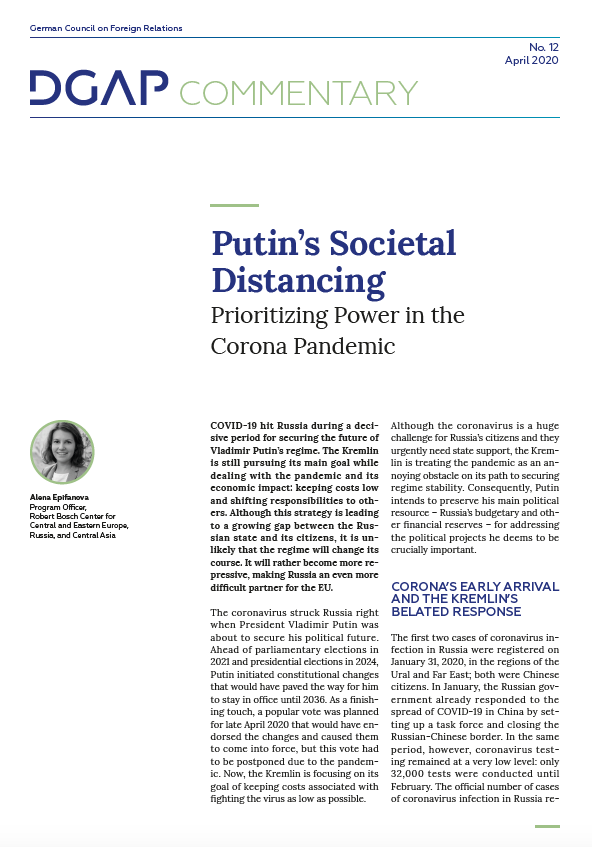The coronavirus struck Russia right when President Vladimir Putin was about to secure his political future. Ahead of parliamentary elections in 2021 and presidential elections in 2024, Putin initiated constitutional changes that would have paved the way for him to stay in office until 2036. As a finishing touch, a popular vote was planned for late April 2020 that would have endorsed the changes and caused them to come into force, but this vote had to be postponed due to the pandemic. Now, the Kremlin is focusing on its goal of keeping costs associated with fighting the virus as low as possible.
Although the coronavirus is a huge challenge for Russia’s citizens and they urgently need state support, the Kremlin is treating the pandemic as an annoying obstacle on its path to securing regime stability. Consequently, Putin intends to preserve his main political resource – Russia’s budgetary and other financial reserves – for addressing the political projects he deems to be crucially important.
Corona’s Early Arrival and the Kremlin’s Belated Response
The first two cases of coronavirus infection in Russia were registered on January 31, 2020, in the regions of the Ural and Far East; both were Chinese citizens. In January, the Russian government already responded to the spread of COVID-19 in China by setting up a task force and closing the Russian-Chinese border. In the same period, however, coronavirus testing remained at a very low level: only 32,000 tests were conducted until February. The official number of cases of coronavirus infection in Russia remained low for a long time, which caused much suspicion about the quality and coverage of testing.
Suspicion particularly grew due to the sharp increase in the number of pneumonia cases in Moscow from January on, possibly caused by coronavirus. In February, the number of people suffering from pneumonia there was 54 percent higher than a year before while no new cases of COVID-19 were officially registered until March 2. The official number of coronavirus infections only started to increase at the end of March.
As of April 30, 2020, almost 106,000 cases of coronavirus were registered in all 85 regions of Russia with more than 1,070 people dead. Testing also increased: so far, almost 3.5 million tests have been conducted, making Russia one of the leading countries in terms of testing for COVID-19. The intensity of the virus’s spread varies from region to region. It has hit Moscow and the Moscow Oblast particularly hard with more than 65,000 cases. The pandemic has revealed many shortages within Russia’s health-care system. For example, the country lacks ventilators, other medical devices, and personal protective equipment, which has put an enormous strain on health-care workers.
Recent developments show that President Putin has been convinced to take the pandemic seriously. He has already postponed both political events scheduled for this spring that were most important to him: the all-Russia vote on April 22 on the constitutional changes he proposed and the Victory Day parade on May 9 to mark the seventy-fifth anniversary of the end of the Second World War. This year’s parade was to bring Putin together with world leaders and veterans from all over the country, sending a highly symbolic message about the strength and power of Russia and its president both internally and externally.
Putin’s Thrifty Approach
Putin’s direct involvement in combating the virus came late and remains limited. In his public speeches to the Russian people, he presents a picture of ever-increasing help by announcing new measures in each new address. This tactic allows him to remain the main “guarantor” of the distribution of much-needed financial assistance. The actual timing of the disbursement of support, however, is more dependent on Putin’s plans and less on the objective situation with the virus. Apparently, its time has not yet come. Corresponding to the political logic described above, the Kremlin is not likely to disburse large-scale financial aid until closer to a rescheduled all-Russia vote on Putin’s proposed constitutional changes or the next elections.
The budgetary measures allocated to combating the coronavirus and its consequences so far only amount to a total of around 2.8 percent of Russia’s GDP. These measures consist mostly of tax relief and loan guarantees and less from direct payments and stimulus. Comparatively, they are much smaller than the financial support provided by countries such as Germany or France. The Russian government is also reluctant to tap a $165 billion national wealth fund for direct financial assistance, preferring instead to use it to support future budget expenditure.
The support approved so far is definitely not enough to sufficiently help citizens and businesses, which were already facing economic problems before the coronavirus crisis. In the first quarter of 2020, the real disposable income of Russians decreased by 0.2 percent compared to the same period in 2019; further decline is expected in the second quarter. As over 60 percent of Russians do not have any savings, the social situation could become difficult for a significant proportion of the population. Approximately 30 percent of small and medium-sized enterprises (SMEs) had to send employees on unpaid leave, while more than 20 percent of companies cut salaries and 16 percent had already dismissed staff during the country’s first “non-working week,” which began in late March.
Still a Very Popular President
Though economic hardships are already visible, they have not affected President Putin’s popularity to an extent significant enough to radically change his approach to combating the virus. A survey conducted from April 13 to 19 by the Russian Public Opinion Research Center (VTsIOM) showed that 69.8 percent of respondents trust Vladimir Putin. This is slightly lower than results of 72.1 to 70.5 percent from the end of March to the beginning of April. Polls by the independent Levada Center indicate a similar trend: the level of approval of Putin’s presidential activities fell from 69 percent to 63 percent between February and March. As for the measures adopted by the president and the government, they were only fully approved of by 46 percent of Russians at the end of April while 48 percent considered them wrong.
In order to protect his reputation, Putin has shifted most of the responsibility for combatting the virus to Moscow’s mayor, Sergei Sobyanin, and to the regional governors. It remains to be seen how the governors will manage the crisis and whether their performance could create unexpected legitimacy for them as regional leaders. A recent survey shows that 75 percent of citizens are satisfied with the governors’ responses to the virus crisis; more than 50 percent of respondents see the measures taken by regional authorities as sufficient. According to the Levada Center, the people trust regional governors almost as much as Putin. Under the current constellation of vertical power, however, it is unlikely that these governors – many of whom are technocrats selected by Moscow and who have few local connections – could constitute any counter-balance to the Kremlin. Instead, they could be used by the Kremlin as scapegoats for potential failures.
Moreover, draconian legislation is in place to prevent mass protests; strict rules for demonstrations have already been enforced. Additionally, digital control has been actively adopted under the cloak of the fighting the pandemic. A new law allows those who spread “fake news” about the coronavirus to be prosecuted. Additional new legislation stipulates harsh punishment for quarantine violation.
Until now, only small protest gatherings have taken place in some of Russia’s regions. Yet in many cities – Moscow, St. Petersburg, Yekaterinburg, and others – people are expressing their dissatisfaction through an innovative form of online protest. They are using the Yandex.Navigator, a popular application created by one of the country’s biggest internet companies, to virtually “gather” around official buildings and write protest slogans in their comments, demanding social payments and government support.
Growing Disconnect
So far, it is unlikely that the Kremlin will change its tactics and spend more to help Russian citizens in the pandemic. Instead, the regime is saving money for the political projects it deems most important for securing its power. It is still unclear, however, whether the planned all-Russia vote on Putin’s constitutional changes or even regional elections scheduled for September 2020 can take place – although the latter was supposed to be a quasi-rehearsal for parliamentary elections in 2021. As campaigning might be complicated due to the virus and voting could give the Russian people a platform to express their discontent, it would not be surprising if the Kremlin decides to postpone these regional elections.
Instead of designing a massive economic and social bailout package, the regime is more likely to use the tools it is most familiar with: spending limited resources to secure a minimally sufficient level of public support, increasing the dependency of businesses and citizens on the state even further, and using repression and intimidation to keep the potential for protest at bay. These measures will neither resolve the growing disconnect between the state and society, nor will they adequately address the economic and social problems Russia is facing. Rather, they will likely make the country even more authoritarian.
The Kremlin’s domestic trajectory will make Russia a more difficult and unpredictable partner not only for the European Union, but also for other champions of multilateralism. As long as the pandemic lasts, Moscow will not change its foreign policy. Instead, it will continue its disinformation campaigns inside the countries of the EU and strengthen its strategic partnership with China. As Germany prepares for its EU presidency in the second half of 2020, the challenges that both sides have been facing since before the pandemic have not diminished. The common ground on which to deal with them, however, has.

